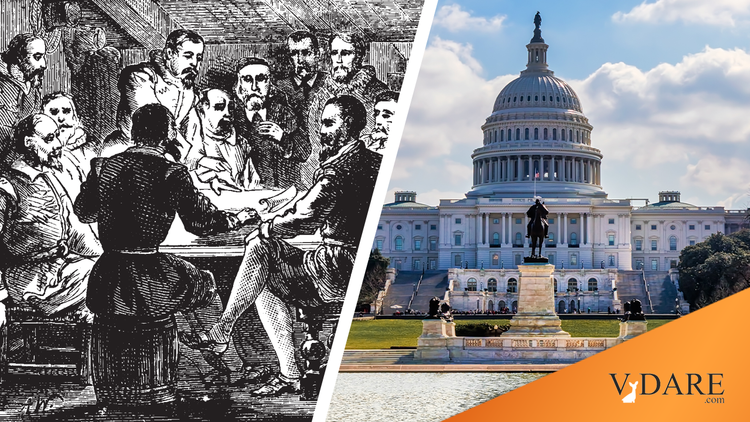
A Northern Reader Says "Yes, It Was 1620!"
03/15/2021
Re: A Virginian Speaks Up For Jamestown As America’s Real Founding; Lydia Brimelow Replies
From: "Spirit Of The Fighting 69th"
Virginians claiming 1607 as America’s founding remind me of the Irish who claim America was discovered by St. Brendan and his happy monks, or the Scandinavians who push for Leif Erickson and the Vikings, where even the Chinese have now gotten into the act. They all may have a point, but so what, the only discovery that counted was the Italian from Genoa sailing for the Spanish crown, Sr. Cristoforo Columbo.
So, it is with Jamestown, whose settlers weren’t there to found a new society, but to seek their fortunes. A permanent settlement was not a priority, only the prodigious efforts of Capt. John Smith could get them to build shelters and plant crops. Jamestown barely survived and many colonists were all for pulling up stakes and hauling their sorry carcasses back to England. That was not the story farther north.
It was the Pilgrims whom Mayflower landed on Cape Cod in 1620 who made the first true settlement. Dissenters in England, and disappointed with their sojourn in Holland, they had set out for the new world, not to seek gold, but to seek God, to worship him and live by his laws as they saw them. Beyond the bounds of Common Law, they formed the Mayflower Compact with which to govern themselves. It is one of our most important historical documents. Together with the Puritans who amalgamated Plymouth Colony into “The Massachusetts Bay” they aimed at creating a truly “New England” free from the vices of the old.
Environment too was a factor in the rise of New England. Its rocky soil was inferior to the rich dirt of the south. It was only natural to look to developing commerce. Shipping and then industry gave it an advantage but that, as well as the religious imperative to make the Bible known required the common school which meant a better educated populace. In The Intellectual Life of Colonial New England Samuel Eliot Morison wrote “the puritans were more keen on education than any other group of the English people.” All of New England, notes Morison, except Rhode Island, had compulsory education, but he further notes these were truly public, not church schools.
Although there were free schools in Virginia and the College of William & Mary (1697), it could not compete with the northeast and New England when it came to higher education: Harvard (1636), Yale (1701), Brown (1746), Princeton (1746), King’s [Columbia] (1754).
New England’s intellectual and literary tradition was paramount into the nineteenth century — Hawthorne, Henry Adams, Francis Parkman, Thoreau, Alcott. One doesn’t see a Southern literature of any influence until after the Civil War, and it doesn’t flourish until the twentieth century — Faulkner, Eudora Welty, Flannery O’Connor, Carson McCullers to name a few. This is not to disparage the South, but it was New England that set the tone for its first settlers came to stay and founded an intellectual tradition that would spread across the country. It is our national misfortune that their traditions have been vilified and abandoned by the institutions they created.
See earlier letters from the same reader, especially A Military Reader Reminds Us That Americans Have Been Self-Governing Since The MAYFLOWER … And We Need To Stay That Way!
